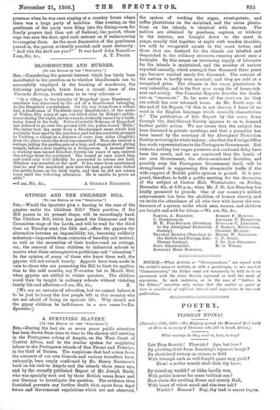A SURVIVING SLAVERY.
[To vas EDITOR OF TLIE "SPECTATOR:1
Snr,—During the last six or seven years public attention has been drawn from time to time to the slavery still existing in the Portuguese colony of Angola, on the West Coast of Central Africa, and to the similar system for supplying labour to the Portuguese islands of San Thome and Principe, in the Gulf of Guinea. The suspicions that had arisen from the accounts of our own Consuls and various travellers have, unhappily, been amply confirmed by Mr. Henry Nevinson's book on his visit to Angola and the islands three years ago, and by the recently published Report of Mr. Joseph Burtt, who was specially sent out by three British cocoa firms and one German to investigate the question. The evidence thus furnished prevents any further doubt that, apart from legal terms and Government regulations which are not observed, the system of working the sugar, sweet-potato, and coffee plantations on the mainland, and the cocoa planta- tions on the islands, is identical with slavery. The natives are obtained by purchase, capture, or trickery in the interior, are brought down to the coast in gangs, usually tied together at night with wooden shackles, are sold to recognised agents in the coast towns, and those that are destined for the islands are labelled and despatched in the ordinary steamers, running about once a fortnight. By this means an increasing supply of labourers for the islands is maintained, and the number of natives exported annually, which averaged four thousand three years ago, has now reached nearly five thousand. The consent of
the natives is hardly even nominal; and they are sold at a recognised price. The climate in the cocoa plantations is very unhealthy, and in the first year many die of home-sick-
ness and misery. Our Consular Reports describe the death- rate as " enormous." So far none of the servicaes (as they are called) has ever returned home. As Mr. Burtt says at the end of his Report, "if this is not slavery, I know of no word in the English language which correctly characterises it." The publication of this Report by the cocoa firms through the Anti-Slavery Society appears to us to demand further public action. We are aware that the subject has been discussed in private meetings, and that a pamphlet has been issued by the secretary of the Aborigines' Protection Society reviewing its whole history ; also that the Foreign Office has made representations to the Portuguese Government. But hitherto nothing but vague promises and continual delay have been the result, and we are convinced that the hands of our own Government, the above-mentioned Societies, and possibly even the Portuguese Government itself, will be strengthened in suppressing this abominable traffic if the wide support of British public opinion is gained. It is pro- posed, therefore, to hold a public meeting for the discussion of the subject at Caxton Hall, Westminster, on Friday, December 4th, at 3.30 p.m., when Mr. J. St. Loe Strachey has kindly promised to preside. One of our country's noblest achievements has been the abolition of human slavery, and we invite the attendance of all who view with horror the con- tinuance of a system under which men, women, and children are bought and sold for labour.—We are, Sir, &c.,
SAMUEL A. BARNETT. ROBERT F. Howrobr.
C. BLIIIIIINGHAM. Licoiesun T. HOBROUSE.
H. R. Fox-Boni:nes (Secretary RUDOLPH C. LEHMANN. to the Aborigines' Protection J. RAMSAY MACDONALD.
Society). GILBERT MURRAY. TRAVERS BUXTON (Secretary to HENRY W. NEVINSON. the British and Foreign Anti- C. P. Scow.
Slavery Society). J. Sr. LOB STRACHEY.
JOHN GALSWORTHY. H. G. WELLS.
ANTHONY HOPE HAWKINS.
































































 Previous page
Previous page